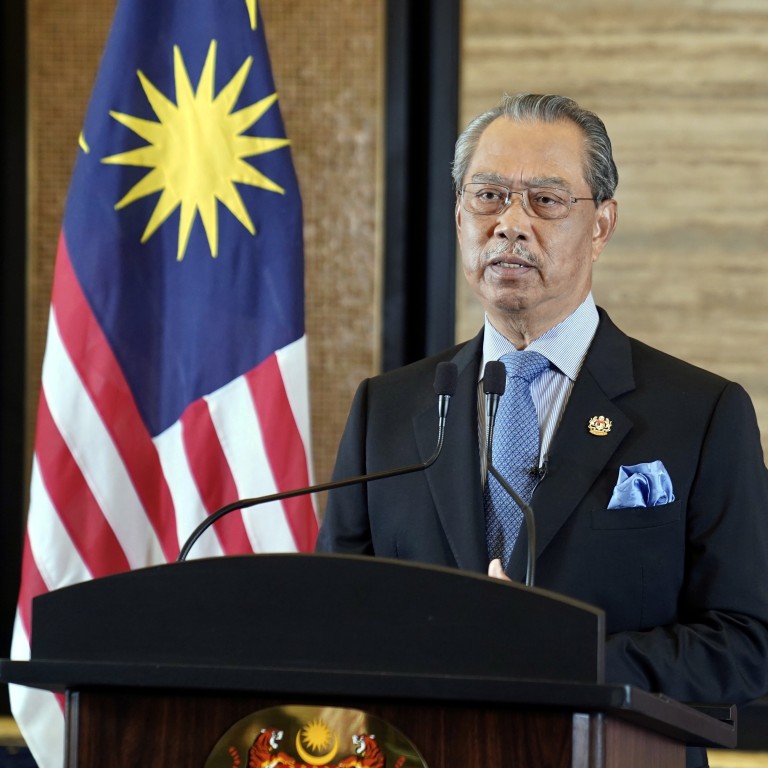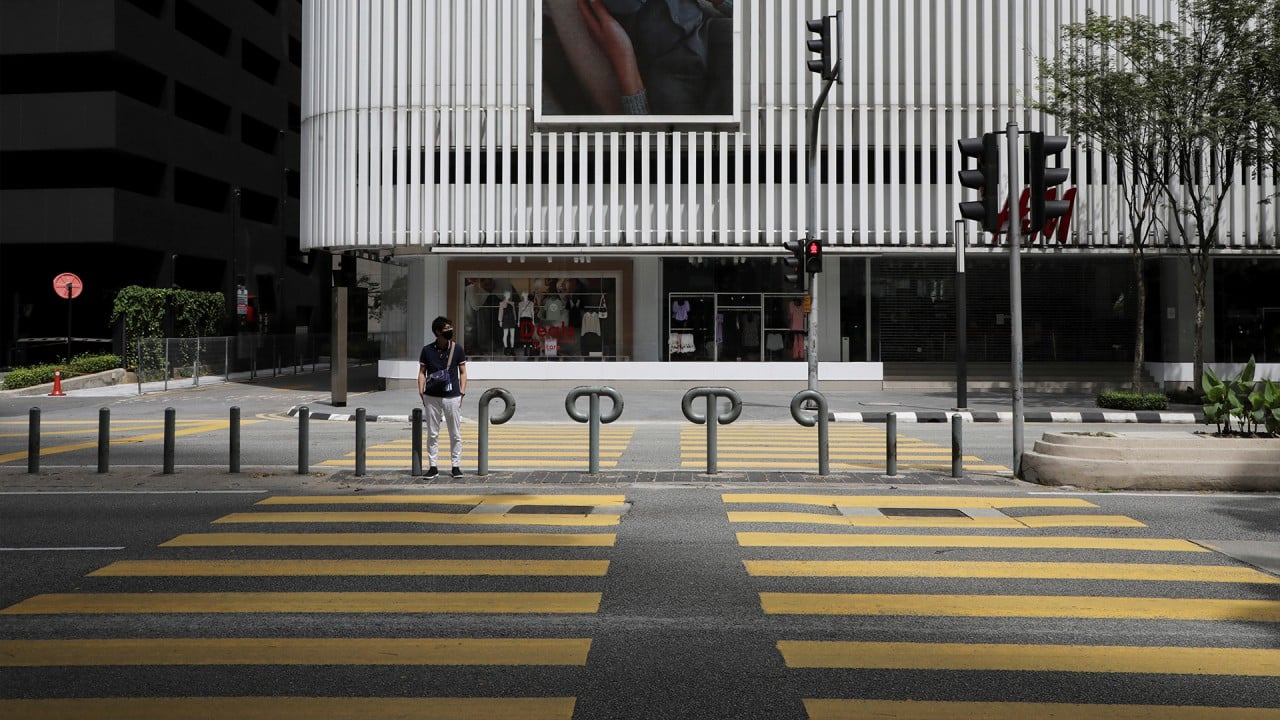
In Malaysia, power struggles, pandemic woes mar Muhyiddin’s first year in office
- The embattled leader has promised to hold elections after the Covid-19 pandemic is under control
- He could now face a fresh no-confidence vote as soon as June, but observers say he is unlikely to be ousted unless his political opponents unify
The embattled leader, speaking in a televised address to mark his first year in power, focused on summing up the government’s achievements and pointedly avoided reference to the power struggle that had dominated his time in office. In the past year, he has fended off challenges from rivals while working to consolidate support from coalition members amid internal bickering.
Muhyiddin said he would advise the nation’s king Sultan Abdullah to dissolve Parliament once the pandemic was over.
What Malaysia’s new coronavirus lockdown and state of emergency means
“Until such time, my colleagues in Cabinet and I will continue to carry out our duties and responsibilities to the best of our ability. When the election is held, of course, we will leave it to the people to decide whether [this] government should be re-elected or otherwise. You are free to choose and that is what democracy is all about.”
“Ultimately, as the government’s future is uncertain, pursuing short term personal benefits – including through illegal means – may be more rational for ministers and bureaucrats than thinking of long term national interests,” said political scientist Wong Chin Huat of Malaysia’s Sunway University.
Shades of a despot? Muhyiddin’s halt of Malaysia’s democracy has familiar feel
“The government’s pandemic management since [the state polls] is more haphazard, its federal budget was not bold or innovative in providing relief or stimulus,” he said.
Muhyiddin’s government may fail to produce coherent policies as it worries more about its own survival than the people’s lives and livelihoods, Wong said – a situation compounded by the state of emergency obstructing a parliamentary vote of no-confidence.
Oh Ei Sun of the Singapore Institute of International Affairs said there was “a trust deficit” among Malaysians in Muhyiddin’s administration following a series of “ad hoc policies and flip-flops”, as well as indignation over perceived double standards of prosecution applied to politicians caught breaching lockdown and social distancing rules.

Accusations of double standards have even been levied by allies, such as Umno member Puad Zarkashi, who criticised the shortening of quarantine periods for ministers to three days in remarks that saw Muhyiddin demanding a public apology and 10 million ringgit (US$2.47 million) in compensation for defamation.
Oh, of the Singapore Institute of International Affairs, said such “missteps would usually be understandable due to a raging pandemic but ministers in his cabinet have made statements which … make people doubt whether their leaders know what is important and what is frivolous.”
Awang Azman Awang Pawi of the University of Malaya’s Institute of Malay Studies said Muhyiddin’s first year in power would be remembered for the nationwide state of emergency, two national lockdowns and elections in the state of Sabah.
He said the national vaccine roll-out would have a positive impact on the public’s perception of Muhyiddin, if it runs smoothly, but “the immunisation plan does not necessarily solve the problems experienced by the country such as a rising cost of living, less favourable economic environment and social inequality”.
Amid political dysfunction, how did Malaysia pull together its vaccine plan?
He then joined forces with Mahathir to set up the nationalist Parti Pribumi Bersatu Malaysia (PPBM), which as a part of Pakatan Harapan managed to topple Umno – the party of power for more than six decades up to that point – and its allies at the 2018 general elections.

02:51
State of emergency in Malaysia as country fights third wave of Covid-19 with fresh lockdown
Last week, Umno’s Puad Zarkashi told local media it was an “open secret” that his party would split from fellow Malay nationalists PPBM – a move he said would officially be announced following its annual general meeting in March.
“If [PPBM] is sincere about Malay unity, why did it partner with Pakatan Harapan to cause Umno to lose power?” he told local news portal The Malaysian Insight.
Such a split could prove disastrous for Muhyiddin’s leadership, although he may be able to ward off a vote of no-confidence in parliament if “the Speaker of the House plays a role in ensuring Perikatan Nasional survives”, said Awang Azman.
Muhyiddin’s former colleagues in Pakatan Harapan have also hit out against him, describing their former ally as “Machiavellian”.
Malaysia’s Muhyiddin takes flak again over Covid-19 double standards
“His Machiavellian side is surprising because previously … he had resigned honourably [from Umno] in protest of the 1MDB scandal,” said Wong Chen, a member of the People’s Justice Party (PKR) that forms a part of Pakatan Harapan. “His willingness now to use all means and inducements to stay in power, including setting in motion an emergency will set a bad political precedent for Malaysia.”
Despite the factors working against Muhyiddin, observers said he is unlikely to face much of a threat from his political opponents unless they can effectively mobilise.
“The opposition is the strongest it’s been in Malaysia’s history with only a narrow margin of three votes, but [has made] no impact in shaping public policy or at least countering Muhyiddin’s narrative,” said Wong Chin Huat of Sunway University.
“Anwar’s obsession with enticing Umno defections to enthrone himself as premier makes him reluctant to form a shadow cabinet, naturally crippling Pakatan Harapan’s ability to offer coherent policy alternatives besides attacking Perikatan Nasional’s weaknesses.”
A lot of us underestimated [Muhyiddin’s] ambition to hang on to power as long as possible
This, as well as the rift between Anwar and Mahathir that dates back to the latter’s first stint as prime minister in the 1990s, are likely to work against Pakatan Harapan when elections roll around, said Awang Azman.
“The opposition still lacks solidarity,” he said. “Given this, it is expected that Muhyiddin will continue on until elections.”
Muhyiddin’s unlikely rise and subsequent moves have shown he is “very good at holding on to power by any means possible,” said Oh, pointing at the state of emergency as an example.
“But in terms of policy I think this is very bad,” he said. “A lot of us underestimated his ambition to hang on to power as long as possible, but he proves to be adamant.”

